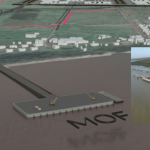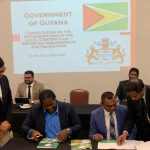
In its final Petroleum Cost Recovery Audit Report for the period spanning 1999-2017, IHS Markit found that a significant percentage of the US$1.6B in claims made by Esso Exploration and Production Limited (EEPGL) – a subsidiary of US oil giant ExxonMobil – lacked supporting documents.
“…nearly 50% of the intercompany charges being included in the Q4 2017 Cost Recovery Statement have limited transparency that falls short of the expected level of accounting documentation. Even after several requests for further clarification, EEPGL has not been able to demonstrate adequate justification for these charges,” the UK audit firm said in the report seen by News Source.
Those charges total some US$78.4M.
The audit firm said the records in the General Ledger were not clear, with information missing on many entries.
“The supporting documentation provided lacks details of what the charge relates to or why it applies to the Stabroek Block”, the company added.
Against that background, it recommended to the Government of Guyana that those claims be denied.
In fact, IHS Markit said the Government has reasonable grounds to dispute more than US$214.4M of the claims made by the oil company.
Of the US$1.6B in claims made by EEPGL for activities in the Stabroek Block for the period 1999-2017, some US$460.2M account for Pre-Contract Costs, while most of the total expenditure – $1.218B or 73% – was incurred between 2016 and 2017, and therefore forms part of the Post-Contract Costs.
But IHS Markit said during the audit, it was found that US$31.43M was included in the Cost Recovery Statement without being recorded in the General Ledger as required under the 2016 Production Sharing Agreement (PSA). It explained further, that the sum related to payments made by Exxon’s co-venture partners, at a time when they were not signatories to the PSA. “The validity of these costs for inclusion in the Cost Bank has not been demonstrated by EEPGL and should be excluded from the Cost Bank,” the firm recommended.
Further, it said while the treatment of VAT was in keeping with the PSA and industry standards, the oil company did not do enough to keep the Government appraised of the activities and costs associated with the development of the Stabroek Block. It was pointed out that the company’s annual work programme and budget were not in keep with best practices, and there were no justifications for the changes in the scope of work or cost overruns as required by the PSA.
IHS Markit, in part, flagged EEPGL’s procurement process. It reported that $953M or 89% of the expenditure related to contracts and invoicing.
“The majority of the contracts reviewed, amounting to expenditure of $613.5M or 64% of the value of those reviewed contracts, were awarded on a competitive basis and are aligned with PSA provisions. However, 25% of the value ($240 million) were single sourced and 11% ($99.5 million) were partial single source contracts,” it explained.
It said contracts awarded on a competitive basis were done in a transparent manner in keeping with the PSA. However, it said in the case of the single source procurement awards, the oil company did not demonstrate the competitiveness of the rates within the contract for contracts with a combined value of $28.4M. As such, it recommended that this too should be removed from the Cost Bank and redirected to profit oil.
The Government, in response, said it is still reviewing the report, which was resubmitted in 2021 given a plethora of concerns. The audit was commissioned in 2019.



















You must be logged in to post a comment Login